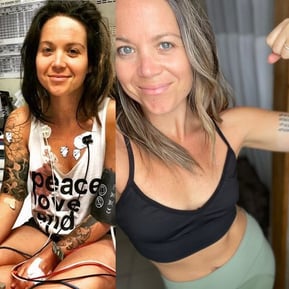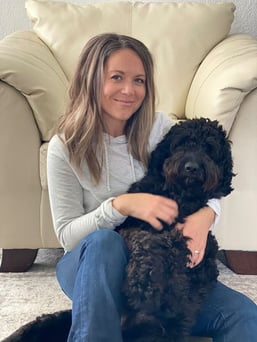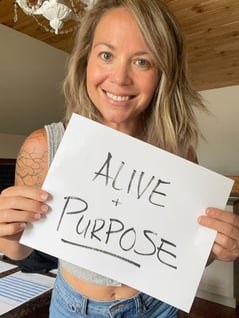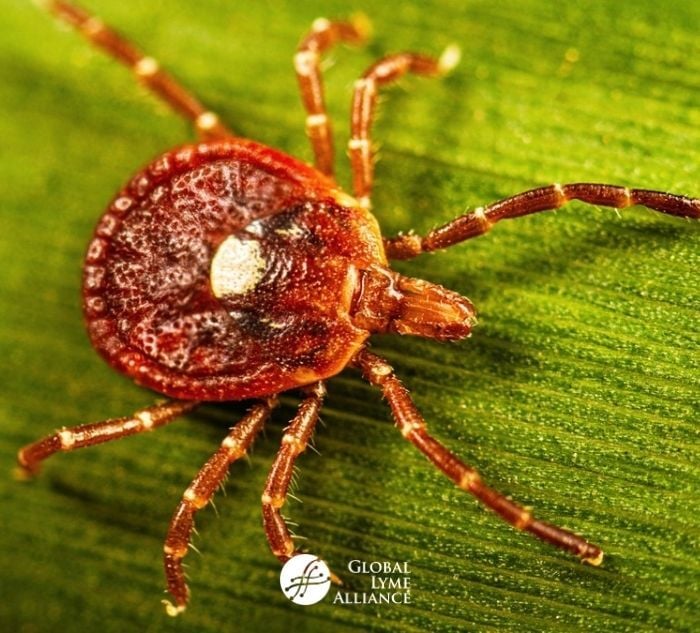.jpg)
“I would eat bark for a year if it would save my life” – Yolanda Hadid
This quote always spoke to me. It illustrates the desperation to feel better and it also ties in the fact that many Lyme patients are asked to remove a long list of foods, making for a highly restrictive diet. So restrictive it might feel like the only thing left is, in fact, bark.
What You Put into Your Body Affects How You Feel
My degree in human nutritional science has been a huge asset in navigating my own journey. Prior to getting bitten I worked as a clinical RD in LTC. I was managing many and multiple chronic and acute illnesses for our residents. When it came time to experience my own mystery illness, especially when doctors weren’t able to make a diagnosis, I decided it was time to do what I could for myself. Five years of education had to come in handy on a personal level too, right?
I started with mountain of research and literature reviews on inflammation and autoimmune disorders. I had been seeing a Rheumatologist for six months while he tried to put a label on what was happening.
When it came to the research, there were a lot of underlying themes but the first step for me was one I didn’t look forward to: an elimination – challenge diet.
 I was bitten in Spring 2014 and I did the elimination-challenge diet in Summer 2015. It felt like the worst time to cut (what felt like) everything out. Summer is full of travel, beach days, BBQs… and it felt like a huge sacrifice. But I was suffering from such severe joint pain, fatigue, brain fog and inflammation… I wouldn’t put it off.
I was bitten in Spring 2014 and I did the elimination-challenge diet in Summer 2015. It felt like the worst time to cut (what felt like) everything out. Summer is full of travel, beach days, BBQs… and it felt like a huge sacrifice. But I was suffering from such severe joint pain, fatigue, brain fog and inflammation… I wouldn’t put it off.
There are more realistic ways of doing elimination-challenge diets than the approach I took. The kind of elimination-challenge diet I did for myself is not something I would ask a client to do. It's invasive, it is incredibly hard to stick to, and to really get a true result, you need to follow it precisely. Because of this, most patients quit or “cheat” and it ultimately ends up being a lot of stress and effort without the benefit of knowing exactly what, if anything, is making you feel worse.
With any long-term dietary restriction(s) there is also an inherent risk for multiple macro and micronutrient deficiencies. When I did this, I brought my family doctor on board and explained what I was doing and we agreed, that if it lasted a significant enough amount of, we would do lab work to make sure there were no deficiencies. I also took all the necessary supplements to balance out what would eliminated in my diet.
What I am sharing might sound like a lot of work, but I have to be honest with you my friends… I nerded out over this. Human nutritional science is my jam, it is exciting. I was my own real life case study, with both objective and subjective data. Without a doubt, I absolutely missed having smores at bonfires, I missed the occasional beer or wine, and I definitely missed my sweets and treats.
Was It Worth It?
Long story short, yes. After 8-10 weeks I was able to ID what foods that severely, or mildly affected me.
But here’s the deal:
This is a multi-month process that takes both the patient and the practitioner hours to record accurately and assess. Knowing what foods I truly needed to stay away from was worth the effort but it didn’t change the trajectory of this illness. Food, nutrition and diet can lend a huge helping hand to managing an illness, but it isn’t the only piece of the puzzle.
Eventually, I became worse.
 By January of 2016, I relied solely on my husband for ADLs (activities of daily living) and personal care. In February we sent a sample to Igenix and in March I was diagnosed. I was inaugurated into this community of Lyme warriors that I’ve come to know and love. I did everything to learn about this illness and coinfections, and I began to share about my journey hoping to create awareness locally. I didn’t know a thing about Lyme Disease or the coinfections until it happened to me; my hope was to prevent that from happening to others.
By January of 2016, I relied solely on my husband for ADLs (activities of daily living) and personal care. In February we sent a sample to Igenix and in March I was diagnosed. I was inaugurated into this community of Lyme warriors that I’ve come to know and love. I did everything to learn about this illness and coinfections, and I began to share about my journey hoping to create awareness locally. I didn’t know a thing about Lyme Disease or the coinfections until it happened to me; my hope was to prevent that from happening to others.
Social media was a tool that allowed me to connect with others early in my journey to learn and ask questions. I began to speak to people from all over Canada and the US, and a few other countries too. As much as I’ve loved meeting new people, many of whom have become great friends, when people would share their story with me – my heart always aches for them.
Losing your health is devastating, having your sense of safety and security within your body being taken from you is life changing.
Eventually most people end up seeing a Lyme Literate doctor, and they begin to truly understand the gravity, suffering and loss that comes with this illness. The icing on the cake? (pun intended) is that many people finish their appointment with the quick mention of the laundry list of foods their doctor suggests they eliminate from their diet.
You’ve lost your health, your abilities, and now you can’t eat most, if not many, of the things you love. The anxiety, stress and feelings of overwhelm begin to stack on top of each other.
Life Becomes a Series of “I can’t” Moments
I can’t work
I can’t get relief from the pain
I can’t do the things I once loved doing
I can’t go out with my friends
I can’t be active anymore
I can’t get out of bed without help
I can’t stand up long enough to cook a meal
I can’t stand up to shower
I can’t eat more things than I can
I can’t afford this treatment
I can’t stop feeling sick from this treatment
I can’t seem to get a break from this illness
When your thoughts and words centre around all you can’t do or experience, that begins to take root and becomes an invisible cloak around your thoughts day-to-day. It took me two years to get a diagnosis and another four years to realize that “I can’t” had taken over my vocabulary and thoughts. It bled out into every aspect of my life. I was living in a constant state of anxiety and in 2020 was diagnosed with clinical depression. It took another one-and-a- half to two-years of working on mindset and mental health every day in order to overcome these thoughts.
Mental Health, Restrictive Diets and Deficiencies
 I still remember being newly diagnosed, sitting in the sauna getting a message on Instagram from a stranger who was also just diagnosed. She was ambitious and willing to do whatever the doctor suggested, I am sure even willing to eat bark for a year. She wanted my opinion on a two month only-fruit diet. From a dietitian’s perspective, I have a long list of concerns with this, first being the laundry list of deficiencies that would come from it.
I still remember being newly diagnosed, sitting in the sauna getting a message on Instagram from a stranger who was also just diagnosed. She was ambitious and willing to do whatever the doctor suggested, I am sure even willing to eat bark for a year. She wanted my opinion on a two month only-fruit diet. From a dietitian’s perspective, I have a long list of concerns with this, first being the laundry list of deficiencies that would come from it.
This conversation was the beginning. Over the years I would hear many stories about the long list of food restrictions people were being asked to follow. I’ve been in this community for seven years; I get three or more messages a week about food restrictions people are following, whether self-imposed or by their practitioner. There is an underlying tone to each of those messages:
People feel overwhelmed, defeated, lost and are grieving the life that they once lived.
Mental health and chronic illness often go hand in hand. I don’t believe a single person can come through an illness unscathed from the mental and emotional effects of their battle. You’re being asked to take 40+ pills a day, a handful of tinctures, a binder that tastes like liquid chalk and then on top of it? You’re given a list of foods you can’t eat.
To-Do or Not-To-Do an Elimination–Challenge Diet
I believe in a very practical, step by step elimination challenge diet. I think most people in this community can benefit from identifying the foods or food groups that exacerbate or trigger symptoms. But I don’t believe in allowing it to rule your life when you’re already following so many strict protocols.
The reason I say that is because we’re all desperately searching for that one thing that will bring change, relief and freedom from illness. We don’t want to feel like we’re struggling just to get by each day and all we’re allowed to eat is bark. But there isn’t one food that every person should eliminate. We’re all different. This illness is still unique to each of us.
When it comes to a practical approach to managing food restrictions, I suggest working with a registered health practitioner and taking a systematic approach. It is much more reasonable to break it down piece-by-piece than to eliminate everything all at once.
It is also important to remember that is it OK to slip up. But choose that.
It's Okay to Slip Up
 Yes, it is counterproductive while you’re trying to identify food triggers and intolerances, but once you know the foods that you need to stay away from and you choose to live outside of that box for a moment, allow it without guilt.
Yes, it is counterproductive while you’re trying to identify food triggers and intolerances, but once you know the foods that you need to stay away from and you choose to live outside of that box for a moment, allow it without guilt.
Don’t create a negative emotional response to eating that pastry made with butter and regular flour, filled with sugar and chocolate. Choose it. Let go of the guilt of “screwing up” - you won’t feel better about the situation by shaming yourself for doing it.
Personally, I avoid dairy… but in those moments when I have the opportunity to have fancy ice cream? You bet I do. One thing I won’t touch with a thirty-nine-and-a-half-foot pole? Is gluten. It truly isn’t worth it to me. But I am more empowered to manage my health because I know what will make me feel worse.
The more you tune into yourself, the more you know and we do better when we know better.
Things To Remember on This Journey
- If you expect it to be the worst thing ever? It will be. Energy flows where your focus goes. If you look for all the hardships, that is all you’ll see. Instead, try to see this as an opportunity for you to be in the driver’s seat and identify what foods are a trigger for you. That is empowerment. When you know what food(s) affect you and you have the power to take control over that to make sure you can take all the steps necessary to feel as well as possible; that is health esteem.
- It's ok to not be ok. Whatever you feel is valid. Seek out support, counselling or a friend to talk to. Try a mindset coach, personal development (self-help books and podcasts) to help with coping strategies.
- FOMO is real. There will be times when you are at an event, holiday or celebration and feel robbed of part of the experience. Food and celebration go hand in hand. My advice is this: offer to bring something you know you can eat and enjoy. There is also a line between following dietary restrictions and feeding your soul. If you’ve gone through the process to learn what foods truly trigger you, continue to avoid them, as they often aren’t worth the pain and discomfort but the others? Let yourself the enjoy the moment and participate.
- Communicate when you are struggling with your doctor and other practitioners. Maybe it isn’t the right time to ask you to give up everything else at once.
When you come out on the other side of all of these restrictions, knowing what applies uniquely to you, you’re on the right path.
Our health isn’t a destination. It is a journey.
It isn’t a straight path or simple. Once you find the tools and resources to enjoy the day-to-day, despite the obstacles - that is when you have the opportunity to feel aligned on this journey.
Click here for more blogs.
Click here to read, "Lyme Disease Nutrition Tips for Optimal Immune Function."
Click here to read, "How to Optimize Your Lyme Disease Recovery with Nutrition."
Click here to read, "Nutrition Tips for Neurological Lyme Disease."
The above material is provided for information purposes only. The material (a) is not nor should be considered, or used as a substitute for, medical advice, diagnosis, or treatment, nor (b) does it necessarily represent endorsement by or an official position of Global Lyme Alliance, Inc. or any of its directors, officers, advisors or volunteers. Advice on the testing, treatment or care of an individual patient should be obtained through consultation with a physician who has examined that patient or is familiar with that patient’s medical history.

Sara Brunner, RD
GLA Contributor
Opinions expressed by contributors are their own. Sara Brunner is a Registered Dietitian (RD) hailing from Canada. In 2014, Sara experienced a significant health challenge after being bitten, initially diagnosed as a spider bite. Despite seeking medical advice, she remained untreated and eventually found herself bed-bound within two years. Throughout this period of undiagnosed illness and escalating symptoms, Sara took proactive measures to manage her health, drawing upon her expertise as a Registered Dietitian. In 2016, Sara received a Lyme+ diagnosis, marking the beginning of her journey towards recovery. It wasn't until 2022 that she began to witness significant improvements. Despite the prolonged and challenging nature of her journey, Sara remained determined. During this time, she focused on developing The Universal Lyme Diet (ULD), a self-paced online course designed to empower individuals with Lyme disease to create personalized nutrition management plans. Scheduled for release in late 2024, the ULD offers a systematic framework tailored to each individual's needs. In the interim, you can join the waitlist for the ULD by visiting: https://training.sarabrunner.com/uldwaitlist For more insights and practical tips on navigating your Lyme journey, follow Sara on Instagram: @thelymedietitian







-2.jpg)